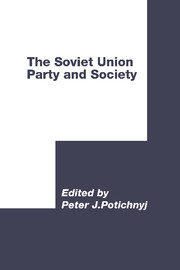Book contents
- Frontmatter
- Contents
- List of figures
- List of tables
- List of contributors
- Foreword by R. C. Elwood
- Preface by P. J. Potichnyj
- Part 1 Party apparat
- Part 2 Socialization and political discourse
- Part 3 Social policy
- 9 Social deprivation under Soviet full employment
- 10 The Soviet social security system: its legal structure and fair hearings process
- 11 Abortion in the Soviet Union: why it is so widely practiced
- 12 Ethnic group divided: social stratification and nationality policy in the Soviet Union
- 13 The party and Russian nationalism in the USSR: from Brezhnev to Gorbachev
- Index
- Publications from the Third World Congress for Soviet and East European Studies
13 - The party and Russian nationalism in the USSR: from Brezhnev to Gorbachev
from Part 3 - Social policy
Published online by Cambridge University Press: 04 August 2010
- Frontmatter
- Contents
- List of figures
- List of tables
- List of contributors
- Foreword by R. C. Elwood
- Preface by P. J. Potichnyj
- Part 1 Party apparat
- Part 2 Socialization and political discourse
- Part 3 Social policy
- 9 Social deprivation under Soviet full employment
- 10 The Soviet social security system: its legal structure and fair hearings process
- 11 Abortion in the Soviet Union: why it is so widely practiced
- 12 Ethnic group divided: social stratification and nationality policy in the Soviet Union
- 13 The party and Russian nationalism in the USSR: from Brezhnev to Gorbachev
- Index
- Publications from the Third World Congress for Soviet and East European Studies
Summary
In the 1960s, the USSR experienced an increase in nationalist feeling and activity. This was not confined to the non-Russian nationalities but occurred among the majority ethnic Russian population as well. In the 1970s, analysts in the West began to take note of this Russian nationalism. I shall attempt in this chapter to outline the main features of the Russian nationalist movement as it developed in the Brezhnev era (1964–82). After discussing briefly some of the Western studies of Russian nationalism, I shall then investigate how Russian nationalism has developed since 1982, under Iurii V. Andropov, Konstantin U. Chernenko and Mikhail S. Gorbachev, and try to assess its future prospects. A particular concern throughout will be the attitude of individual political leaders to Russian nationalism. For reasons of space, I shall concentrate on those manifestations of Russian nationalism permitted in the official political and cultural media, and not on unofficial activity and samizdat.
In Stalin's last years, the Russian people were presented with chauvinist official claims about their historical achievements, while the non-Russians were treated as second-class citizens. Under Stalin, this Russian nationalism was tightly controlled. Nikita Khrushchev's denunciation of Stalin in 1956 laid the basis for the development of Russian nationalism in a partly or wholly autonomous direction. The liberalization of controls over culture allowed a certain pluralism to appear in the official literary journals, and later for the expression of uncensored nationalist views in samizdat.
- Type
- Chapter
- Information
- The Soviet Union: Party and Society , pp. 229 - 244Publisher: Cambridge University PressPrint publication year: 1988
- 1
- Cited by

